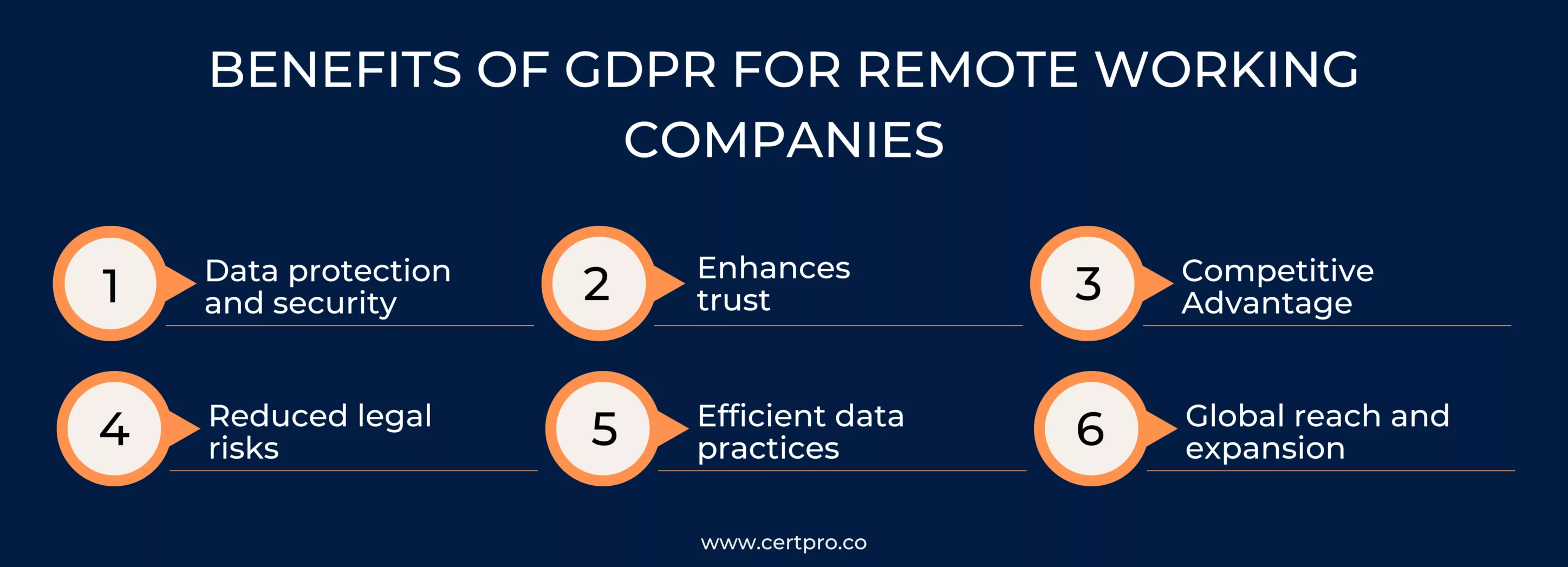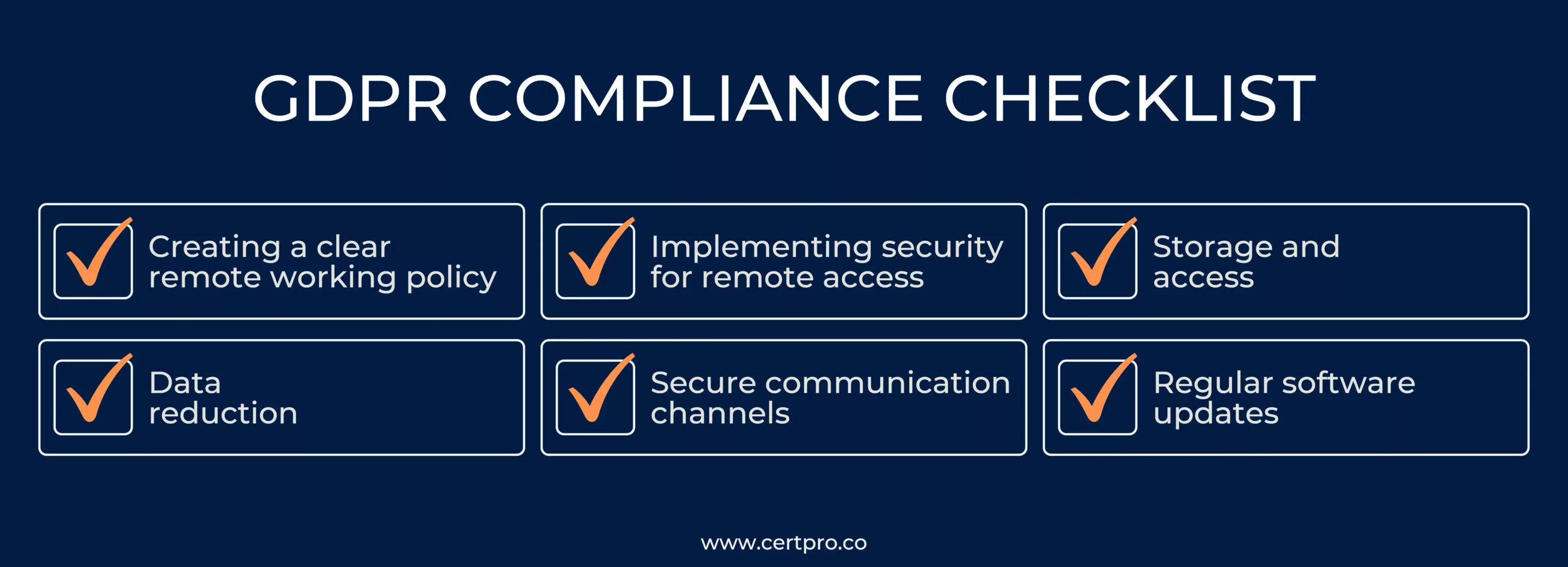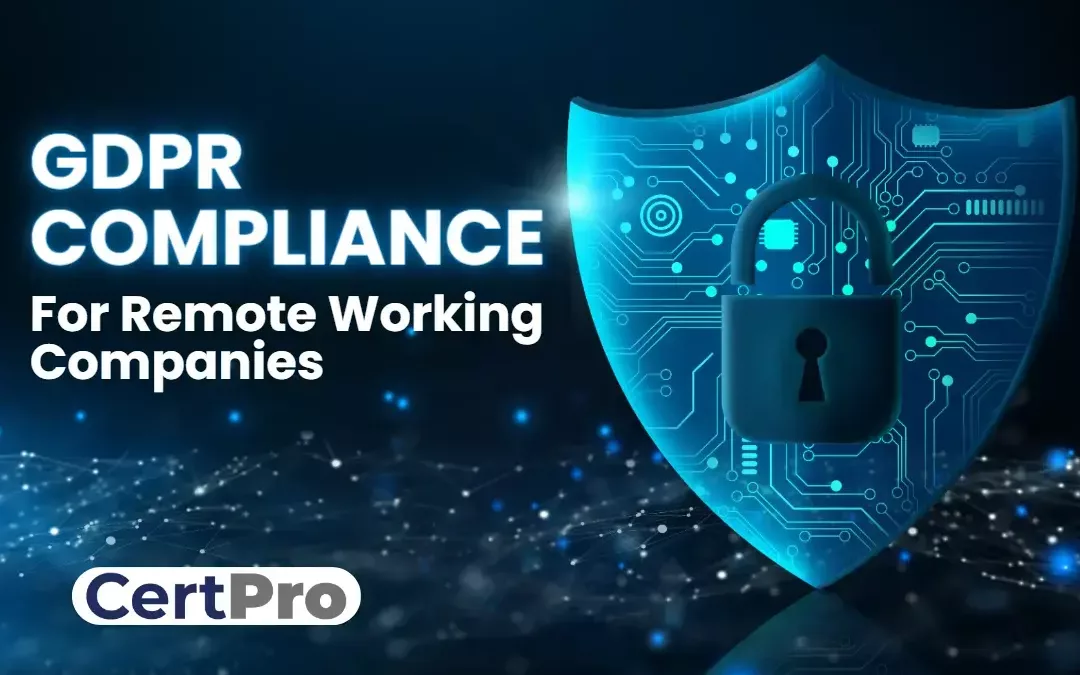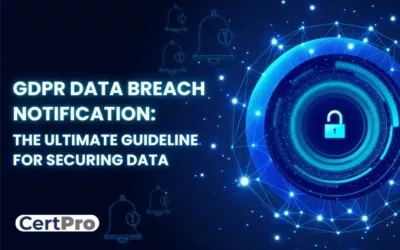The COVID-19 pandemic has caused a dramatic change in how we operate, with a rise in remote working methods. Working from home became necessary for many employees all across the world as businesses reacted to the problems provided by the epidemic. This change has highlighted the importance and viability of remote employment as a long-term substitute, even after the pandemic has passed. Working from home is beneficial, but it also has drawbacks that some individuals might experience. Companies that are working from home have one of their biggest fears: they must manage the difficulties of upholding data privacy rules when workers work outside the typical office environment as remote work becomes more common. Compliance with the General Data Protection Regulation (GDPR) is crucial for businesses that are embracing the flexibility and advantages of remote employment. These firms must proactively adopt new security measures designed to address the particular difficulties provided by remote working environments in order to assure compliance and protect sensitive information.
This article is about how GDPR compliance helps companies, how companies gain advantages with GDPR, and will take a look at the GDPR compliance checklist. Let’s delve into this article and learn about the concepts of GDPR.
WHAT IS GDPR?
The General Data Protection Regulation is a set of regulations established by the European Union (EU) on May 25, 2018 to protect the privacy and personal data of individuals. Simply put, the goal of General Data Protection Regulation is to offer individuals greater control over how businesses and organizations acquire, use, and disclose their customers’ personal information. Those that violate the GDPR’s privacy and security requirements risk paying harsh fines of up to tens of millions of euros.
When processing personal data, companies have a duty to abide by a set of guidelines and procedures under General Data Protection Regulation. Individuals are also given certain rights under this compliance, including the right to access their personal data, the right to have it updated or deleted, and the right to be informed when a data breach has compromised their data.
Benefits of GDPR for Remote Working Companies
The General Data Protection Regulation provides businesses that have embraced remote work practices with a number of benefits. This compliance serves as a critical framework for protecting data privacy as enterprises navigate the world of remote workers and virtual communication. Let’s examine how the General Data Protection Regulation helps remote working organizations in more detail:
- Data protection and security: General Data Protection Regulation lays out strict guidelines for data security and protection. Remote-working businesses can strengthen their data security methods and secure sensitive information by adhering to these rules.
- Enhances trust: A company’s commitment to GDPR shows its dedication to data privacy and protection. This dedication may increase client confidence and trust in the business, resulting in a favorable reputation. Companies that prioritize GDPR compliance while operating remotely provide clients, consumers, and partners with the reassurance that their personal information is treated with care, establishing deeper connections and additional business prospects.
- Competitive Advantage: This compliance can give remote-working enterprises a competitive edge in an environment where privacy concerns are on the rise. An organization may stand out from rivals by prioritizing data protection and demonstrating compliance.
- Reduced legal risks: Non-compliance with GDPR can result in severe penalties, legal risks, and even prison time. By complying with the GDPR regulations and requirements, remote working companies can mitigate the risks of facing higher fines and reputational damage. GDPR compliance reduces the probability of investigations and associated costs and helps provide a more stable and secure environment for organizations.
- Efficient data practices: GDPR compliance inspires companies to review their data practices. Remote-working companies can align their data collection, storage, and processing procedures with the GDPR regulations and requirements. This helps reduce the risks associated with the data breaches as well.
- Global reach and expansion: GDPR compliance can help businesses enter the European market. Remote businesses handling the personal data of EU citizens are required to abide by GDPR standards, enabling them to operate and interact with European clients or consumers with confidence. GDPR can create a better platform for worldwide businesses to develop themselves.

GDPR COMPLIANCE CHECKLIST: HOW TO ACHIEVE GDPR
Remote work has a higher priority these days. Ensuring GDPR compliance has become a priority for organizations, and complying with the regulations of GDPR is crucial to protecting personal data and maintaining the trust of customers. In this blog post, we will go through a comprehensive GDPR compliance checklist specifically tailored for companies operating remotely. By following this compliance checklist, companies can ensure that their remote work environment aligns with the General Data Protection Regulation.
Creating a clear remote working policy: Create a clear standard for remote working that also covers data security and privacy. Specify in detail for staff members how to manage personal data, interact securely, and use corporate technology. Establishing procedures for reporting security or data breach occurrences.
Implementing security for remote access: Employees who are working remotely might not have proper security measures, such as using their personal devices or laptops that may not be equipped with the proper and necessary technical requirements to safeguard that organization’s workstations located in the office. Due to this lack of protection, users may become vulnerable to outside dangers such as clicking dubious links, downloading files, or visiting dubious websites.
Storage and access: Remote employees might not be aware of the significant distinctions between accessing corporate data from the workplace and at home. The data might be the same, but when it is handled without the proper technical requirements and protections, its integrity gets lost.
To avoid such issues, following these steps is necessary
- Make sure employees have safe remote access to corporate resources and information.
- To safeguard data while it is being sent for any purpose, use encryption techniques and virtual private networks (VPNs).
- To prevent unwanted access, impose strict authentication procedures, such as multi-factor authorization.
- Updating and patching remote access software often helps fix security flaws.
Data reduction: Implementing principles such as data reduction can help reduce the chances of your company’s data being exploited. Gathering and maintaining a minimal amount of information essential for business needs is called data reduction. Review your data storage procedures and remove any personal information that is no longer essential.
Secure communication channels: The use of secure communication should be a major priority when sharing information with any coworkers. Encourage staff to use secure file-sharing websites, encrypted chat applications, and email services.
Regular software updates: Remind staff to regularly update their software and applications with the most recent security fixes. To stop potential exploits, often check for software flaws and immediately install any updates that are required.
Organizations may significantly enhance their data protection policies and guarantee regulatory compliance by carefully following these essential GDPR compliance checklists. While this is not an exhaustive list, implementing these measures serves as a strong foundation for achieving GDPR compliance in a remote work environment.

WHAT TYPES OF COMPANIES SHOULD BE GDPR COMPLIANT?
Companies and organizations that handle the personal data of people living in the European Union (EU) are subject to the General Data Protection Regulation. The law has extraterritorial application, so firms outside the EU are subject to it if they provide products or services to people inside the EU or keep track of their conduct.
A few of the following organizations must conform to GDPR:
- EU-based companies: Companies based in the EU are required to abide by the General Data Protection Regulation if they process personal data, regardless of their size or sector. Also Companies outside the EU that provide products or services to people inside the EU or keep track of their behavior are subject to the GDPR. This covers internet companies, e-commerce sites, and service providers that cater to EU clients.
- Data processors: Companies that handle personal data on behalf of other organizations, such as cloud service providers, data analytics firms, or IT service providers, are referred to as data processors and are subject to GDPR regulations. The rule outlines precise requirements and duties for them.
- Data brokers and third-party data processors: Firms that compile personal data from numerous sources, sell it to other businesses, or make it available to others have to comply with the GDPR. Data brokers, marketing firms, and other organizations that handle personal data for clients are included in this.
It is essential to remember that everyone who handles personal data of EU citizens, including small enterprises, startups, and independent contractors, may be subject to the General Data Protection Regulation. The GDPR applies to all sectors and is not only confined to certain industries. Failure to comply with the GDPR regulations can result in significant fines and penalties.
GET ASSISTANCE FROM CERTPRO: LEADING AUDITOR AND CONSULTANTS
CertPro is a leading provider of GDPR compliance solutions, offering a range of services to help organizations achieve and maintain compliance with the General Data Protection Regulation (GDPR). CertPro‘s expertise lies in guiding businesses through the complex process of GDPR compliance. Providing comprehensive assessments and audits to identify gaps and areas of non-compliance within an organization’s data processing practices helps companies stay out of trouble.
Assisting in the development and implementation of robust data protection policies and procedures tailored to each organization’s specific needs also provides guidance on data mapping and classification, ensuring that personal data is properly identified, categorized, and protected.
FAQ
What are the primary actions needed to comply with GDPR?
Conducting a data protection audit, mapping data flows, identifying personal data, and putting in place suitable organizational and technical data security measures are the key steps in achieving GDPR compliance.
Why is data mapping crucial for GDPR compliance, and what does it entail?
The process of locating and outlining the flow of personal data inside a company is known as data mapping. It aids organizations in comprehending the types of personal data they gather, where they store it, how they handle it, and who they share it with.
What role might employees have in GDPR compliance?
They have to get instruction on data protection principles, their duties related to managing personal data, and how to respond to inquiries regarding data subject rights. Employees contribute to GDPR compliance efforts by sticking to data protection rules and procedures and helping to secure the security and privacy of data.
What is the security of remote work?
The area of cybersecurity known as remote work security is focused on safeguarding company data and other assets when employees perform their duties away from an actual workplace.
What falls under GDPR's definition of personal data?
Any information that may directly or indirectly identify a person is referred to as personal data. It consists of names, addresses, email addresses, ID numbers, IP addresses, and even cookies and other internet identifiers.

About the Author
SHREYAS SHASTHA DRUPADHA
Shreyas Shastha Drupadha, a Senior Business Consultant. Serving as an ISO 27001 Lead Auditor, Shreyas ensures the establishment of robust information security management systems. His expertise also encompasses GDPR, HIPAA, CCPA, and PIPEDA implementation.
HOW TO CONDUCT A GDPR AUDIT FOR MY BUSINESS?
The General Data Protection Regulation (GDPR) is vital for today's digital landscape. It is a cornerstone for safeguarding people's privacy rights in the European Union (EU). Therefore, organizations dealing with EU residents' data must follow these GDPR rules....
GDPR DATA BREACH NOTIFICATION: THE ULTIMATE GUIDELINE FOR SECURING DATA
Modern businesses require incorporating personal data protection strategies to ensure customer satisfaction and business growth. In this respect, the European Union's General Data Protection Regulation (GDPR) sets strict standards for maintaining data security....
GDPR Compliance Software: Boosting Business Efficiency
Handling large amounts of personal data has become a significant concern in today's digital landscape, necessitating a thorough understanding of the intricate legal framework, particularly within the European Union. An essential piece of legislation in this regard is...




